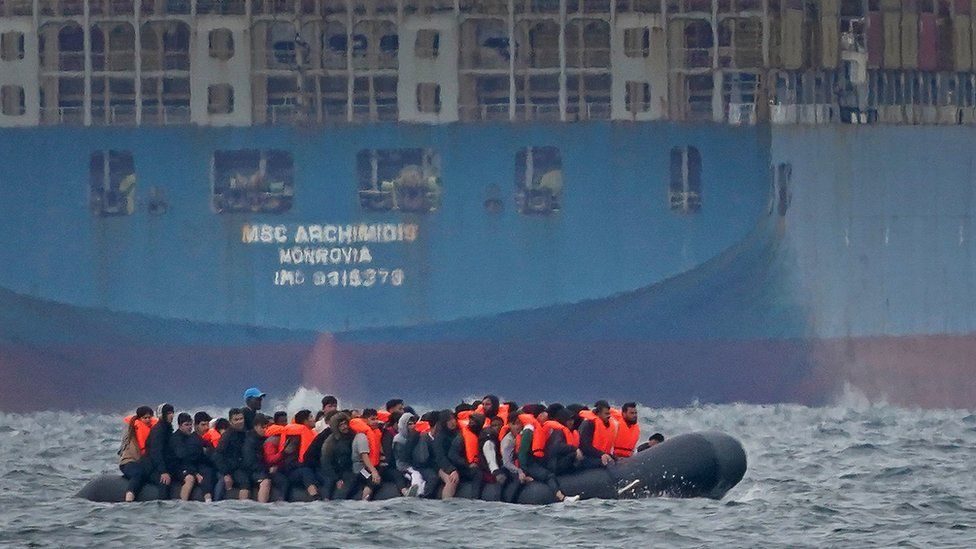
A group of people thought to be migrants in the English Channel last year
By George Bowden & Robert Cuffe, head of statistics
BBC News
The UK’s asylum backlog is falling, new figures show, driven by an increase in decisions being made.
The number of approvals and refusals rose significantly last year, according to the latest Home Office data.
Figures show that the Home Office made 74,172 initial decisions on asylum applications during 2023, nearly four times the number made in 2022.
The Home Office hailed the progress made, but Labour criticised the continued cost of hotel accommodation.
The figures show 45,768 asylum seekers were in hotel accommodation at the end of 2023 – little changed on the year before.
Two-thirds of the asylum decisions were positive, a slightly lower rate than in the previous two years.
But the total number of people granted humanitarian protection hit a new record.
Some 62,336 people were issued refugee status or other protection, the highest figure since records began and double that seen the previous year.
Nearly 31,000 people were refused protection, five times more than were refused the year before.
The number of UK asylum applications withdrawn in 2023 was 24,027, relating to 25,583 people – more than four times the number in 2022, when there were 5,255 withdrawn applications relating to 5,944 people.
Some 79% of withdrawn applications in 2023 were classed as “implicit withdrawals”, meaning the Home Office chose to withdraw the application rather than the applicant withdrawing it themselves.
This has drawn criticism that the Home Office has used withdrawals to speed up clearing the backlog, following a pledge made by Prime Minister Rishi Sunak.
Enver Solomon, from the Refugee Council, said: “Withdrawals should never be used as a way to reduce the backlog and should only be employed in certain, very specific circumstances.”
The figures released on Thursday showed 3,902 people who applied before 28 June 2022 were still waiting for a decision by last December. The government counts these cases as “legacy applications” and had pledged to clear this backlog by the end of 2023.
The most common countries of origin for asylum seekers were Afghanistan, Iran and India. The number of Albanians seeking asylum fell by almost five times, following a returns agreement agreed by the UK and Albania in 2022.
A bar chart showing that the backlog of asylum cases in the UK is falling
In addition to asylum seekers, 102,000 people moved to the UK through legal humanitarian routes. These were mostly people from Ukraine and Hong Kong, but also family members of refugees.
A Home Office spokesperson said: “We are making progress to stop the boats and last year the UK bucked the trend by reducing illegal migration and made significant steps in tackling abuse of our asylum system.
“Channel crossings were down by more than a third, we cleared the legacy asylum backlog, enforced returns were up by 66% and we returned 50 hotels back to their communities.
“We will pass our Rwanda Bill so that those who enter the UK illegally can be quickly removed to a safe third country. Only by removing the prospect that illegal migrants can settle in the UK can we control our borders and save lives at sea.”
Labour shadow home secretary Yvette Cooper said: “A year after promising to end their use, almost 46,000 people are still stuck in hotels.
“The Tories’ failure to clear the backlog and return small boats arrivals has blown a £4bn hole in the Home Office budget, paid at taxpayers’ expense.”








